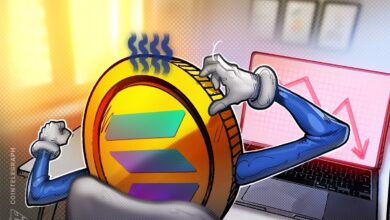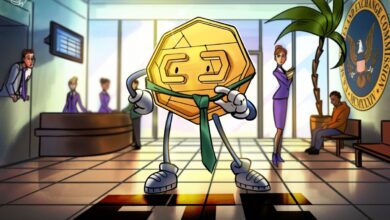Russian banks debut crypto products for qualified investors

The Bank of Russia has officially permitted financial institutions to offer certain cryptocurrency-based financial instruments to accredited investors.
Russian banks are now free to provide qualified investors with a range of crypto products, including crypto derivatives, securities and other digital financial assets tied to crypto prices, the central bank announced on May 28.
A key stipulation, however, is that these products must not involve the “actual delivery of cryptocurrencies,” the Bank of Russia emphasized.
The announcement came alongside the Bank of Russia reporting a 51% increase in crypto asset inflows by Russian residents in the first quarter of 2025, totaling 7.3 trillion rubles ($81.5 billion).
T-Bank among the first to offer Bitcoin investment products
Some major Russian banks have started rolling out cryptocurrency investment products immediately following the Bank of Russia’s announcement.
T-Bank (formerly Tinkoff Bank), one of the largest commercial banks in Russia, on May 29 announced the offering of digital financial assets (DFA) tied to Bitcoin (BTC).
“The tool allows you to invest in cryptocurrency in rubles through a familiar application — safely and within the legal framework of the Russian Federation, without opening an account on a crypto exchange and difficulties with protecting your wallet,” the bank said.
T-Bank’s new “smart asset” offering is issued through the Russian state-backed tokenization platform Atomyze and is available exclusively to accredited investors.
Direct crypto investments still not encouraged
While greenlighting local lenders to offer crypto products, the Russian central bank still maintains a restrictive approach regarding direct cryptocurrency investment.
“The Bank of Russia still does not recommend financial institutions and their clients to invest directly in cryptocurrencies,” the Bank of Russia said in a statement.
Related: Russia arrests Blum co-founder Vladimir Smerkis on fraud charges
The central bank also mentioned the ongoing government discussions on the potential launch of an experimental regime that would allow certain investors to trade crypto assets like Bitcoin directly.
Russia’s estimated CEX holdings are at $9.2 billion
In its latest financial stability review, the Bank of Russia estimated Russians’ crypto holdings on centralized exchanges (CEXs) at 827 billion rubles ($9.2 billion).
According to the authority, Bitcoin is leading Russians’ CEX holdings with a 62% share, with Ether (ETH) following at 22%. Stablecoins like Tether USDt (USDT) and Circle’s USDC (USDC) ranked third with a share of 15.9%.
Some local crypto enthusiasts observed that the actual figure of cryptocurrency held by Russians is significantly bigger than the estimated CEX holdings reported by the Bank of Russia.
“I know that [Pavel] Durov and [Alexey] Bilyuchenko alone have more money in their wallets than this amount,” Sergey Mendeleev, founder of the digital settlement exchange Exved, wrote on his Telegram channel. He hinted that Russians hold way bigger crypto amounts in wallets and decentralized exchanges.
Magazine: Crypto wanted to overthrow banks, now it’s becoming them in stablecoin fight




